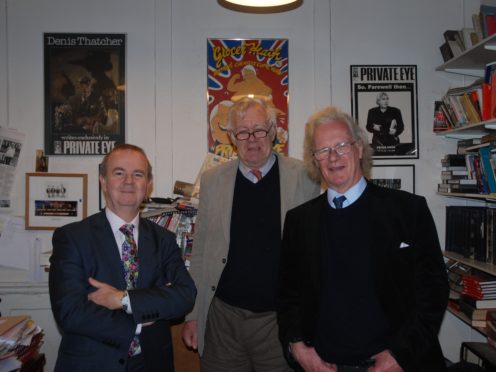Christopher Booker, the first editor of Private Eye, has died after a short illness aged 81, the magazine has said.
The journalist and author also wrote for The Sunday Telegraph since its launch in 1961, covering a variety of topics including literature, religion and climate change.
He famously opposed British involvement in the European Union.
We are very sad to announce the death today of Christopher Booker. author, journalist, satirist and the first editor of Private Eye, after a short illness. He was 81.
A full appreciation of his life and contributions to the magazine will be published in a future edition. pic.twitter.com/uqMKsqVbzs
— Private Eye Magazine (@PrivateEyeNews) July 3, 2019
In a statement, the magazine said: “We are very sad to announce the death today of Christopher Booker, author, journalist, satirist and the first editor of Private Eye, after a short illness. He was 81.
“A full appreciation of his life and contributions to the magazine will be published in a future edition.”
Booker’s books included Castle of Lies and The Great Deception, where he put forward Eurosceptic arguments that would lay the foundation for much of today’s Brexit debate.
In 1961, he was one of the founders of the satirical magazine Private Eye alongside Richard Ingrams and Willie Rushton.
He was its first editor but was ousted by Ingrams in 1963. He returned two years later and remained part of the team for the rest of his life.
Of his time on the team, which also featured current editor Ian Hislop, he said: “Over the years … I have enjoyed some of the most hilariously pleasurable times I can remember in my life.
“Between us we have laughed our way through tens of thousands of joke items.”
Booker attended the independent and boarding Shrewsbury School and Corpus Christi College, Cambridge, where he read history.
Writing in his final piece for The Sunday Telegraph on March 31 this year, he said “one of my guiding principles as a journalist had been to bring to light what I considered to be some shockingly important story which was not being properly covered elsewhere”.
He added: “And one of the reasons I have been very grateful to The Sunday Telegraph is the unusual freedom it gave me to pursue a long succession of such campaigning stories, if necessary for years on end.”
Mr Booker finished his piece by writing: “We are told we should try to leave the world in slightly better shape than we found it.
“But as I prepare to leave it, I have too long felt that I was no longer trying to change it and was only writing its epitaph.
“Nevertheless I cannot forget all the thousands of admirable people I have come across through my years writing for the Telegraph.
“To them and all my loyal readers I am profoundly grateful”.
Private Eye’s current editor Ian Hislop described him as an “extraordinary thread” through the magazine’s history.
He told PA: “It’s amazing that for the nearly 60 years he was coming into Private Eye he was writing jokes. This is our 15,000th issue and for most of those issues Christopher wrote superb jokes. He was an extraordinary thread through the entire history of the magazine.
“Christopher’s ability, his great sense, was that he did jokes based on fact. He had an amazing gift of turning the real thing into something really funny. He wasn’t a surrealist. Christopher was always trying to use humour to understand British public life in all its glory.
“His hinterland was amazing, all the way through to him being a music critic. When I was allowed to join this incredible group he said to me: ‘We’ve been a trio but we could certainly become a quartet’. He was welcoming.
“Like a lot of satirists he was deeply traditional. He lived a very idyllic life in the country. But even in his old age he always kept that sense of outrage. To keep that up until your last days is quite an achievement.”
